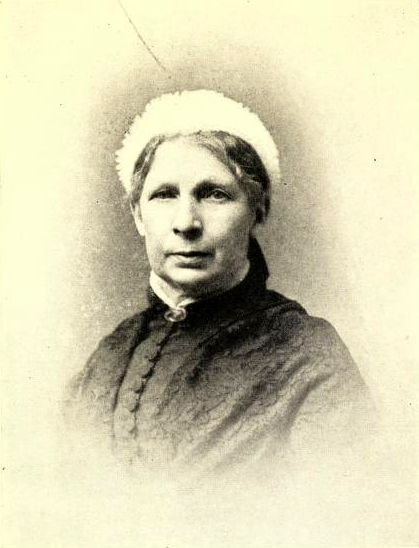 |
| Elizabeth Shaw Melville in 1885 via Wikimedia Commons |
"...the desire of my heart has been to see my husband’s books resurrected, as it were, to call forth as they have begun to do, the recognition which their birthright might reasonably claim." --Elizabeth Shaw MelvilleIn The Early Lives of Melville, Merton M. Sealts, Jr. highlighted contributions to Melville biography by Arthur Griffin Stedman, among others. Sealts acknowledged the crucial role of Melville's wife in republishing Typee, Omoo, White-Jacket, and Moby-Dick:
"The 1892 edition, published with Stedman's indispensable help, was her primary effort...." --Early Lives, page 78; and Pursuing Melville, page 215
And Sealts recognized additional "examples of Mrs. Melville's realization of every new opportunity to keep her husband's name and fame before a larger audience" such as her supplying "a previously unpublished portrait of Melville for use in the Century Magazine" and assisting her friend Harriette M. Plunkett with materials for Plunkett's article in the Springfield, Massachusetts Sunday Republican (July 1, 1900).
The chapter in Early Lives on "Family Reminiscences" transcribed Elizabeth Shaw Melville's notebook memoranda, but Sealts did not consider her independently of Stedman in the chapter on "Biographers of the Nineties."
With proper credit to Sealts and also the 1969 doctoral dissertation on Elizabeth Shaw Melville by Amy Elizabeth Puett, Kathleen E. Kier supplements and to some extent counterbalances the history of early biographies by focusing on the gracious agency of Melville's "sharp-witted" and "stoic" wife.
The chapter in Early Lives on "Family Reminiscences" transcribed Elizabeth Shaw Melville's notebook memoranda, but Sealts did not consider her independently of Stedman in the chapter on "Biographers of the Nineties."
With proper credit to Sealts and also the 1969 doctoral dissertation on Elizabeth Shaw Melville by Amy Elizabeth Puett, Kathleen E. Kier supplements and to some extent counterbalances the history of early biographies by focusing on the gracious agency of Melville's "sharp-witted" and "stoic" wife.
My focus here is on Elizabeth, and my purpose is to establish that she herself provided the principal impetus behind the crusade, though she was well aware that a professional man of letters would have to handle the particulars.
Lizzie’s correspondence reveals that even near the end of her life this sharp-witted lady’s first priority was re-establishing Melville’s stature in the literary world.
Here is the conclusion of Kier's article "Elizabeth Shaw Melville and the Stedmans, 1891-1894" in Melville Society Extracts 45 (February 1981) pages 3-8 at page 8:--"Elizabeth Shaw Melville and the Stedmans, 1891-1894," Melville Society Extracts 45 (February 1981) page 3.
When Arthur’s personal problems become overwhelming, Lizzie gently lets him off the hook, excusing his absence from her life: “I can understand—as perhaps few can so well, the absorption of a busy literary man.” This last statement, in light of current discussion of the problematic nature of the Melville marriage, says a great deal about the gentle, stoic Elizabeth and her relations with her husband. Whatever storms their fragile marriage had earlier encountered, they were over at the end and mattered little, if at all, to her. That a woman involved for over forty years in the intense and complicated business of writing and publishing books should choose to continue the struggle after her husband’s death, when she might have been grateful for respite, should silence those who have questioned her spirit or her wisdom relating to Melville’s works. --Kathleen E. Kier, Melville Society Extracts 45, page 8
Photo Credit: Maisons d'écrivains


Harriette Plunkett had been Elizabeth's neighbor in Pittsfield after Harriette's husband had purchased the Wendell farm from Oliver Wendell Holmes. John Gretchko
ReplyDelete